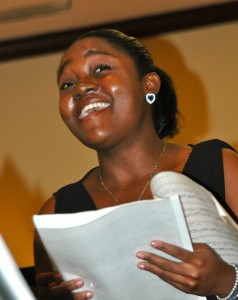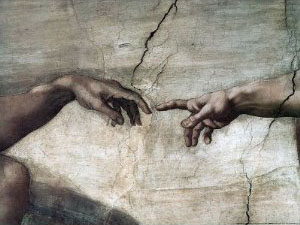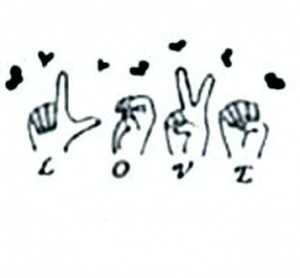Keynote address for the Diocese of Southwestern Virginia’s Millennial Development Goals Day 2011
One of the reasons I believe I was asked to be your presenter this morning is not just that I served as an Appointed Missionary in Haiti, nor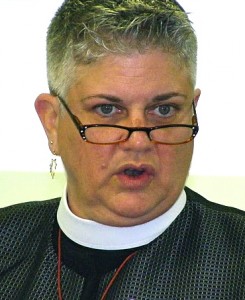 that I served as an Appointed Missionary in Sudan … but because I have lived at the other end of the MDGs, the Millennial Development Goals, that I have seen the power and the hope that come from these goals, and that I can stand here, as a witness to tell you:
that I served as an Appointed Missionary in Sudan … but because I have lived at the other end of the MDGs, the Millennial Development Goals, that I have seen the power and the hope that come from these goals, and that I can stand here, as a witness to tell you:
It is good.
It is good … that we gather here this morning to learn more about the MDGs, to spend time together discerning how we can help meet these goals, to network with each other so that our efforts are not overlapping or duplicated.
It is good … that we are listening to God’s call to us, through Moses and the Law and the Prophets, through God’s only-begotten Son, Jesus Christ, whom we follow.
It is good … that we center ourselves in this call, and discern how we are to live our lives through that call, not just until 2015 (which the United Nations set as an initial deadline when it developed this program), but for all of our lives.
Yes, indeed, my friends, it is good that we are here this morning, listening to God’s call to us.
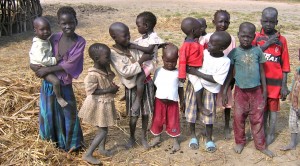 Before we go any farther, I want to show you a movie on the MDGs, an overview, if you will, with all the statistics you will ever need to know. Afterward, I want to take some of your questions and see if together we can answer them, so that all of us have a common understanding of the goals and of what we as a community of God’s beloved children are attempting to accomplish. If someone could turn off the lights, please?
Before we go any farther, I want to show you a movie on the MDGs, an overview, if you will, with all the statistics you will ever need to know. Afterward, I want to take some of your questions and see if together we can answer them, so that all of us have a common understanding of the goals and of what we as a community of God’s beloved children are attempting to accomplish. If someone could turn off the lights, please?
(Show Achieving the Millennial Development Goals – movie on YouTube)
Now, let’s spend some time on this idea that the Millennial Development Goals are God’s call to us.
To understand this better, let’s go back to the beginning, back to before there was a need for these goals, back to when God first called us.
In the beginning, after God created the heavens and the earth and all that is in them – the birds of the air and the fish of the sea and the cattles of the land – God created humanity. God said, “Let us make humankind in our image, according to our likeness;” … So God created humankind in his image, in the image of God he created them.”
Theologically, this means that being created in God’s image is the imperative behind our involvement in the MDGs, for to be created in God’s image is to be created first in the image of love, and what are the MDGs if not a visible sign of God’s love for all of us? We know that the first image of God is love because we are not necessary to God. God is necessary to us but we are necessary to God, for God was before we were, and God will be after we are, so we cannot possibly be necessary to God. Which means that God wanted us, that God desired us into being, that God loved us into being. So the first image in which we are created is one of love.
Because we are Christians, the second image of God in which we are created is one of community, for God the Father, God the Son and God the Holy Spirit never act independently of each other. In our reading of the Scriptures, all three persons of the Trinity are present from before the beginning, and they always work together. Which means that we are created in that image, the one of community, as well.
So what it all boils down to is this:
God created us in love and community to live in love and community.
And does that not sound exactly like the MDGs?
Isn’t living in love and community exactly what the MDGs hope to accomplish?
 If you spend any time at all in the Scriptures, you will see that God indeed intends us to fulfill everything that the MDGs call for:
If you spend any time at all in the Scriptures, you will see that God indeed intends us to fulfill everything that the MDGs call for:
End poverty and hunger? How often does God call us to care for the needy, to not reap to the very edges of our fields, or gather the gleanings of our harvests, but instead shall leave them for the poor and for the alien? (Lev. 23:22)
 Universal education? Does not God say that we are to put these words of God’s in our hearts and souls, that we are to teach them to our children, talking about them when we are at home and when we are away, when we lie down and when we rise? (Deuteronomy 11:18)
Universal education? Does not God say that we are to put these words of God’s in our hearts and souls, that we are to teach them to our children, talking about them when we are at home and when we are away, when we lie down and when we rise? (Deuteronomy 11:18)
Gender equality? I know … there are many who would claim that the Bible says nothing about women being equal, but those who say that seem to ignore the fact that when God created  humankind in the first chapter of Genesis, God created them, man and woman, in God’s image. I can’t give you a better example of all people being created equal than that.
humankind in the first chapter of Genesis, God created them, man and woman, in God’s image. I can’t give you a better example of all people being created equal than that.
Health care for both mothers and children, and combating HIV/AIDS? These are calls for basic health care for all people, especially for those who are considered the least of our brothers and sisters. God is clear that we are to care for the widow, the orphan and the stranger in our midst – in essence, to care for those whom society has deemed lesser. And  hard as it is for us to hear this, in much of the world, women, children and those infected with HIV/AIDS are considered to be either lesser creatures or outcasts. Isaiah told us, and Jesus repeated it to us, in case we weren’t quite clear on the concept, that we are to give sight to the blind and hearing to the deaf and voice to the mute, that we are to make the lame leap for joy and yes, we are to raise the dead. Clearly God wants us to perform miracles … health care for mothers and children and those infected with HIV/AIDS in many countries – including our own, by the way? – that’s a miracle in and of itself.
hard as it is for us to hear this, in much of the world, women, children and those infected with HIV/AIDS are considered to be either lesser creatures or outcasts. Isaiah told us, and Jesus repeated it to us, in case we weren’t quite clear on the concept, that we are to give sight to the blind and hearing to the deaf and voice to the mute, that we are to make the lame leap for joy and yes, we are to raise the dead. Clearly God wants us to perform miracles … health care for mothers and children and those infected with HIV/AIDS in many countries – including our own, by the way? – that’s a miracle in and of itself.
 Sustaining the environment? Did not God tell us to fill the earth and subdue it, and to have dominion over it and over all of God’s creatures, and does not dominion really mean not that we are to lay waste to creation or harm God’s creatures, but rather that we are to be good stewards of creation?
Sustaining the environment? Did not God tell us to fill the earth and subdue it, and to have dominion over it and over all of God’s creatures, and does not dominion really mean not that we are to lay waste to creation or harm God’s creatures, but rather that we are to be good stewards of creation?
And finally, global partnerships. Is this not what it means to live – truly live – into the image of God in which we are created? To live in love and community?
 Author and theologian Frederick Buechner, in his book Wishful Thinking, wrote:
Author and theologian Frederick Buechner, in his book Wishful Thinking, wrote:
We have it in us to be Christs to each other and maybe in some unimaginable way to God too—that’s what we have to tell finally. We have it in us to work miracles of love and healing as well as to have them worked upon us. We have it in us to bless with him and forgive with him and heal with him and once in a while maybe even to grieve with some measure of some grief at another’s pain and to rejoice with some measure of his rejoicing at  another’s joy almost as if it were our own. And who knows but that in the end, by God’s mercy, the two stories will converge for good and all, and though we would never have had the courage or the faith or the wit to die for him any more than we have ever managed to live for him very well either, his story will come true in us at last. (p. 89)
another’s joy almost as if it were our own. And who knows but that in the end, by God’s mercy, the two stories will converge for good and all, and though we would never have had the courage or the faith or the wit to die for him any more than we have ever managed to live for him very well either, his story will come true in us at last. (p. 89)
 We are called – and we are capable – of working miracles of love and healing in this world. We have it in us to bless each other, those whom we know and those whom we have never met and will never meet.
We are called – and we are capable – of working miracles of love and healing in this world. We have it in us to bless each other, those whom we know and those whom we have never met and will never meet.
But that’s part of the problem, isn’t it?
The fact that we don’t know the people we are asked to help?
The fact that we probably never will meet them?
Never mind the fact that this whole MDG thing is so darned huge – so overwhelming – that it’s hard to wrap our hearts and minds and arms around it. (Face it: We are talking about changing the entire world here … the MDGs are probably the boldest vision ever set forth by the United Nations, by the 181 nations taking part in the program, which means that basically, this program is humongous.)
Sometimes, it’s hard to keep the momentum going on a project like this because we don’t know the people. We don’t know their names. We don’t know their stories. And because we don’t know their names or stories, there is a tendency to let our brothers and sisters in Christ, who are related to us not by the blood of their birth but by the waters of their baptism, to let all of God’s beloved children, slip onto the back burner of our lives. Without names, without stories, it’s hard to connect.
And if we can’t connect, we certainly can’t live as fully as possible into the image of God, can we?
One of the main questions we have to answer, not just today but every day of our lives, is how we are going to help make God’s dream – which theologian Verna Dozier identified as “a good creation of a friendly world of friendly folk beneath a friendly sky” – how are we going to make that come to fruition if we don’t know with whom we are walking under those friendly skies?
For many of us, these goals are, as I said, just too darned big. We want to take part … we want to make an impact … but … but … how? We’re just a few people (in the greater scheme of things) and there is so much need … what are we to do?
The best way to approach the needs of the world is to forget that these are the needs of the entire world, to stop thinking we need to save the world (that’s already been done, my friends, 2,000 years ago, outside the gates of Jerusalem) and to concentrate on what we can do, individually and corporately.
Remember, our mission is to live in love and community.
So let’s figure out how to do that … how to live in love in the community we have been given.
We are called to approach caring for all of God’s beloved children – no matter where they are, no matter their tribe or color or race or language or gender or faith – with the advice of Mother Teresa (a woman who knew something about taking on seemingly impossible tasks) ringing in our ears:
The good you do today (she said) may be forgotten tomorrow.
Do good anyway.
Honesty and transparency make you vulnerable.
Be honest and transparent anyway.
What you spend years building may be destroyed overnight.
Build anyway.
People who really want help may attack you if you help them.
Help them anyway.
Give the world the best you have and you may get hurt.
Give the world your best anyway.
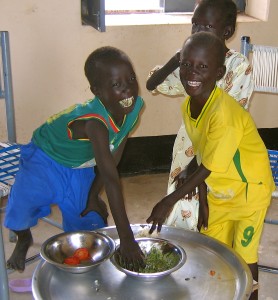 In other words, do not worry about saving the world — that’s already been done, 2,000 years ago, on a Friday afternoon, about 3 o’clock, outside the gates of Jerusalem. Worry only about doing your part to live in love and in community, for that is how God created you.
In other words, do not worry about saving the world — that’s already been done, 2,000 years ago, on a Friday afternoon, about 3 o’clock, outside the gates of Jerusalem. Worry only about doing your part to live in love and in community, for that is how God created you.
A life well lived is not a life of complete and total success my friends. It is, rather, a life of trying. A life of falling down and getting back up. It is, most of all, a life of loving.
The MDGs? They’re not so much about success as they are about love. About loving others whom we do not know and might never meet, about building up community, about re-orienting the world away from power and dominion to love.
So how do we do this? How do we handle this monster task, with all its frustrations?
Listen to the late Rev. Peter J. Gomes, the Plummer Professor of Christian Morals and Pusey Minister in the Memorial Church of Harvard University, who preached:
The question should not be, “What would Jesus do?” but rather, more dangerously, “What would Jesus have me to do?” The onus is not on Jesus but on us, for Jesus did not come to ask semidivine human beings to do impossible things. He came to ask human beings to live up to their full humanity; he wants us to live into the full implication of our human gifts, and that is far more demanding.
God is not asking us to do impossible things.
God is asking us to do the simple things: To live in love and in community – which is why we are created! This is our mission in life. The MDGs? Those are just one path among many that we can take as we strive to do that which Jesus asks us to do.
We cannot, in our short time together today, answer all the questions, raise all the money or solve all the problems that the MDGs face.
What we can do together this day, however, is meet some people. We can meet each other, and we can meet people who are on the receiving end of the MDG work we do.
In other words, let’s make the MDGs personal.
Instead of approaching them as this humongous set of ideas and instructions that no one, not even a government, can fully embrace, let’s approach this the way God does. Let’s look at the situation through God’s eyes.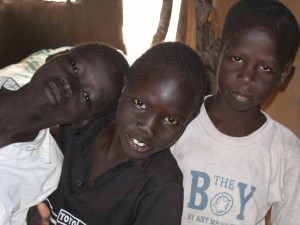
Let’s look at the people.
(Show movie, Not Strangers, But Friends – link to the movie)
(Narration to accompany the movie:)
The people you are see here are my friends – and through me they are your friends … in Sudan, in Haiti, in Honduras. They are people who have benefited from your generosity.
I want you to know:
Every time you go a fund-raiser for the MDGs, however you do it and for whatever goal you have chosen, you are not raising money for a stranger. You are raising this money
for a friend.
The people you see in this movie? I have lived with them. I have broken bread with them. We have worshipped together. We have laughed together. We have cried together. They are my family. And because I know them, and you know me, you know them as well.
Some of these students? They receive their education through your generosity … through your support of various organizations and churches. Some of these children attend schools sponsored by UNICEF. Some of them receive food from the World Food Program. Many of them have received help directly from your parishes.
These women? Many of them received help from parishes in this diocese, including for a microfinance project. And your support of health clinics.
Every time you give in a way that is connected to the MDGs, you help these people and so many others just like them.
These are not strangers.
(End narration.)
I want to be crystal clear about one thing:
God is calling us to live in love.
God is calling us to live in community.
God, who called us into being because God wanted us, desired us, calls us to live in “ a good creation of a friendly world of friendly folk beneath a friendly sky.” A
And the only way we are going to be able to do this is if we all decide that God is right, that God knows what God is doing, and that it is possible to make sure that the hungry are fed and the thirsty given water and the sick have medicine and that our children are educated and HIV/AIDS is finally, finally, finally at least controlled until it can be wiped out … that we remember that God made each and every one of us, that God called each of us into being, that we are all members of God’s beloved community, which means that we are all equal, and that we will thrive only when we all work together, and finally, that we show respect to God for the wondrous things that he has made, including this fragile earth, our island home.
In Washington, D.C., between the end of the Memorial Bridge and Arlington Cemetery, there is a memorial to the Seabees, the U.S. Naval Construction Battalions, who build things under fire and in horrific conditions because that is what they do: they build.
At the base of the memorial, you will find this motto:
With willing hearts and skillful hands, the difficult we do at once;
the impossible takes a bit longer.
My friends, God has given us the skills we need to do everything that God has ever asked of us. Nothing is impossible with God, and God makes sure that in the end, nothing will be impossible for us.
We have the gift of faith.
We have the gift of courage.
We have the gifts of foresight … and planning … and imagination.
The MDGs are difficult – no doubt about it.
Impossible? So what? That just takes a little longer.
Amen.
• • •
Millennial Development Goals Day Keynote Address, 19 March 2011, The Diocese of Southwestern Virginia, St. John’s Episcopal Church, Waynesboro, Va.
